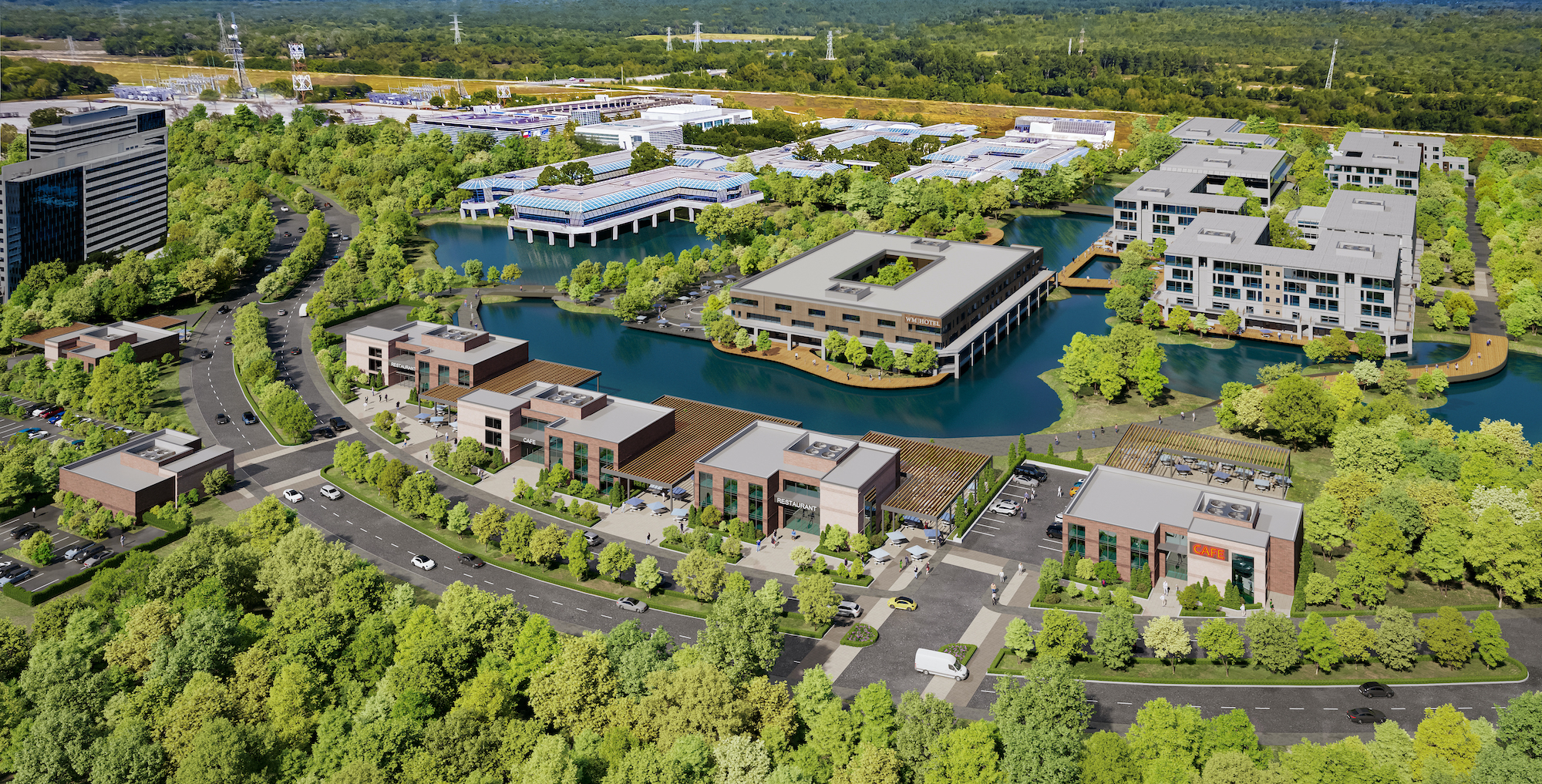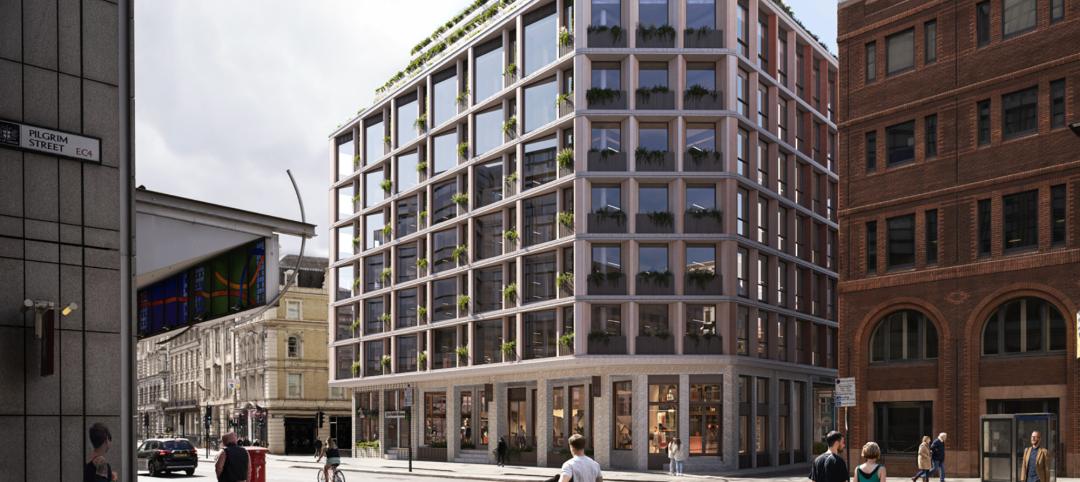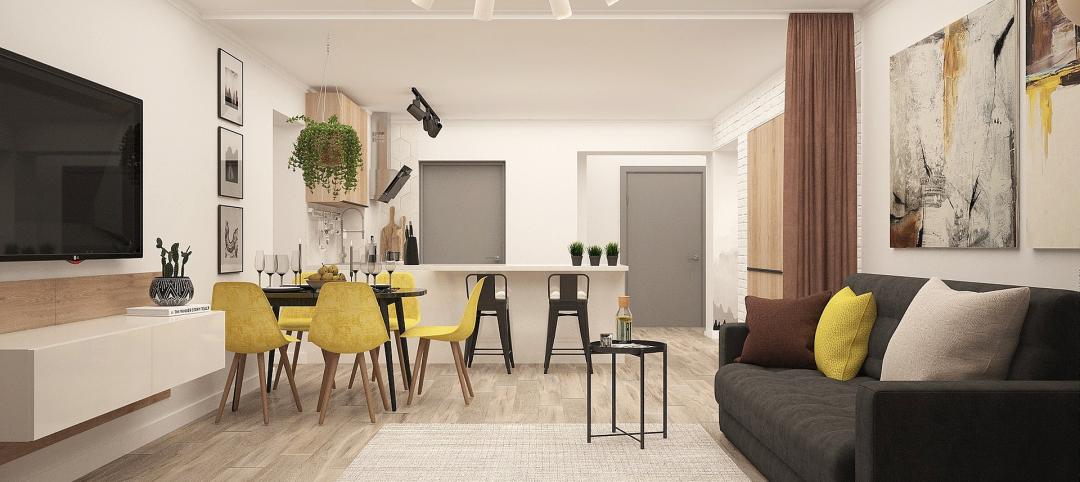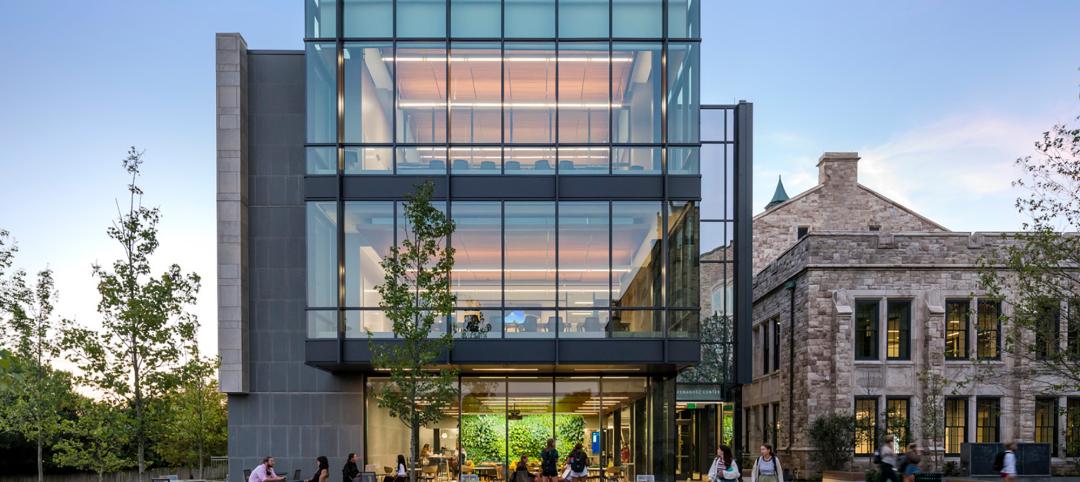Houston-based Midway, a real estate investment, development, and management firm, plans to redevelop the former ConocoPhillips corporate headquarters site into a mixed-use destination called Watermark District at Woodcreek.
In the late 1970s, architect Kevin Roche originally designed the Conoco site so that it resembled a Japanese fishing village, with bridges over ponds and grassy areas connecting the 16 three-story office pavilions.
To preserve this history and minimize carbon impact, Midway plans to repurpose some of the 70-acre site’s existing infrastructure while creating new office, multifamily, retail, restaurant, and hotel opportunities, all surrounded by waterfront views and outdoor walkways.
“Watermark is … an urbanization of the suburban experience in one of the fastest-growing regions in Houston,” said Brad Freels, Midway Chairman and CEO.
Midway says it will repurpose portions of the existing 1.3 million square feet of office space while preserving the low-rise, low-density work environment. Once completed, Watermark’s 650,000 square feet of office space will offer flexible floorplans, abundant natural light, and direct access to surrounding amenities.
To support a vibrant neighborhood after working hours, Midway plans to repurpose existing buildings as luxury multifamily apartments and a boutique hotel, and the development will include various restaurants, cafes, and bars. Midway also intends to modernize the existing 100,000-sf fitness facility.
In addition, Midway has partnered with cleantech social impact company 374Water to provide a fully integrated sustainable wastewater management system at Watermark. The system will transform wastewater and food wastes generated onsite into valuable resources, such as clean water, energy, and minerals, that will be reused within the district. The project also will preserve more than 500 trees.
On the Building Team:
Owner and developer: Midway
MEP engineer: I.A. Naman
Structural engineer: VSM Structural Engineers
Landscape architect: OJB
Related Stories
Adaptive Reuse | Jul 27, 2023
Number of U.S. adaptive reuse projects jumps to 122,000 from 77,000
The number of adaptive reuse projects in the pipeline grew to a record 122,000 in 2023 from 77,000 registered last year, according to RentCafe’s annual Adaptive Reuse Report. Of the 122,000 apartments currently undergoing conversion, 45,000 are the result of office repurposing, representing 37% of the total, followed by hotels (23% of future projects).
Urban Planning | Jul 26, 2023
America’s first 100% electric city shows the potential of government-industry alignment
Ithaca has turned heads with the start of its latest venture: Fully decarbonize and electrify the city by 2030.
Multifamily Housing | Jul 25, 2023
San Francisco seeks proposals for adaptive reuse of underutilized downtown office buildings
The City of San Francisco released a Request For Interest to identify office building conversions that city officials could help expedite with zoning changes, regulatory measures, and financial incentives.
Sustainability | Jul 13, 2023
Deep green retrofits: Updating old buildings to new sustainability standards
HOK’s David Weatherhead and Atenor’s Eoin Conroy discuss the challenges and opportunities of refurbishing old buildings to meet modern-day sustainability standards.
Multifamily Housing | Jul 11, 2023
Converting downtown office into multifamily residential: Let’s stop and think about this
Is the office-to-residential conversion really what’s best for our downtowns from a cultural, urban, economic perspective? Or is this silver bullet really a poison pill?
Adaptive Reuse | Jul 10, 2023
California updates building code for adaptive reuse of office, retail structures for housing
The California Building Standards Commission recently voted to make it easier to convert commercial properties to residential use. The commission adopted provisions of the International Existing Building Code (IEBC) that allow developers more flexibility for adaptive reuse of retail and office structures.
Adaptive Reuse | Jul 6, 2023
The responsibility of adapting historic university buildings
Shepley Bulfinch's David Whitehill, AIA, believes the adaptive reuse of historic university buildings is not a matter of sentimentality but of practicality, progress, and preservation.
Multifamily Housing | Jun 19, 2023
Adaptive reuse: 5 benefits of office-to-residential conversions
FitzGerald completed renovations on Millennium on LaSalle, a 14-story building in the heart of Chicago’s Loop. Originally built in 1902, the former office building now comprises 211 apartment units and marks LaSalle Street’s first complete office-to-residential conversion.
Multifamily Housing | May 23, 2023
One out of three office buildings in largest U.S. cities are suitable for residential conversion
Roughly one in three office buildings in the largest U.S. cities are well suited to be converted to multifamily residential properties, according to a study by global real estate firm Avison Young. Some 6,206 buildings across 10 U.S. cities present viable opportunities for conversion to residential use.
Multifamily Housing | May 16, 2023
Legislators aim to make office-to-housing conversions easier
Lawmakers around the country are looking for ways to spur conversions of office space to residential use.cSuch projects come with challenges such as inadequate plumbing, not enough exterior-facing windows, and footprints that don’t easily lend themselves to residential use. These conditions raise the cost for developers.

















